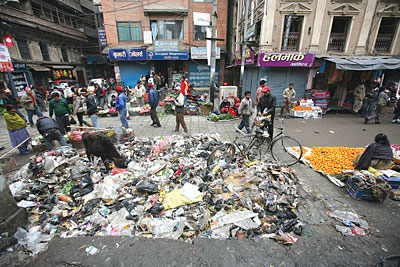 KIRAN PANDAY |
The stretch of road between St. Xaviers School in Maitighar and Martin Chautari in Thapathali houses some of the richest people in the country, at least judging by the McMansions, long driveways and lush gardens. The road leading to these houses is a reminder of a remote village in the hills where a four-wheel drive can barely maneuver across the potholes.
The obvious disrepair of very basic and essential infrastructure isn't due to the helplessness of the people in the community. Rather it seems to indicate a pervasive willingness to wait for someone else, i.e. the government, to fix it. When it comes to access and improvement of services the residents of Thapathali, Sanepa and Lazimpat seem to be as dependent on the government as those of Taplejung, Simikot and Lamidada.
Last week, the publisher of this newspaper wrote: "15 per cent of Nepal's population is working abroad at any given time, and they send home $2 billion a year. This is improving family cash income, but it doesn't always correlate with access to services like years of schooling, safe drinking water, electricity, or chronic hunger in children. Many of these basic services are the prerogative of the state..."
Perhaps if we were talking about new age concepts like happiness and satisfaction, the role of money would have required deeper investigation. If it is tangible services like school education, some iodine pills for your water or food for your children, why does a family with an improved income need to wait for the state to access these services, especially when the government has proven to be anything but effective?
Statements like these may be the perfect kicker to an article, but are worrying because because they gloss over the details. A few weeks ago, the host of Sagarmatha Television's primetime news program ended a segment about child labour by grandly announcing that "the government needs to look after these children." There was no discussion of how he thought the government should go about doing that. Did he mean we should have more Bal Mandirs, the state-run orphanage long accused of corruption and even child trafficking?
There is merit in welfare services provided by the state to the poorest of its people and the most helpless, but none whatsoever in everyone waiting for the government to spoon feed us. The government is unable to manage expectations and even less able to get things done. More than 30 years after identifying Melamchi as a source of water for the residents of the capital, the project has yet to begin in earnest. Major hydropower projects like Arun III have been stalled in the planning phase for years and are yet to deliver more value than just as talking points.
One could argue that the reason we are stuck in a cycle of violence, or in the continual threat of one, is because the government is deemed so important. Foreign aid is distributed through the government. It has the largest share in the economy. It runs health services to the majority of the population in Nepal, as well as education, while it is clear
that it is the private sector that is better at providing more choices and better services in both these areas.
Instead of asking for the end of state intervention in every aspect of our lives, we seem to be crossing our fingers and hoping that with one perfect government we can have a Swedish socio-heaven in this country. It might not happen in our lifetime, so we are better off looking elsewhere if we want our roads to be fixed.
READ ALSO:
Hard choices, PRASHANT JHA
Tail between our legs, PUBLISHER'S NOTE
Following the paper trail, CK LAL
Systemic failure, ASHUTOSH TIWARI



